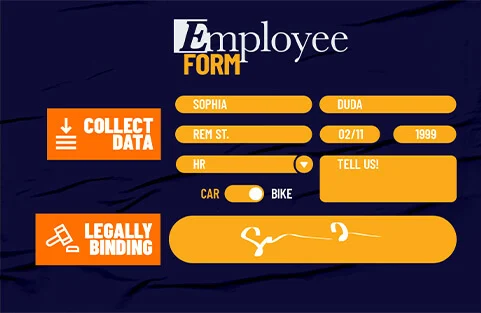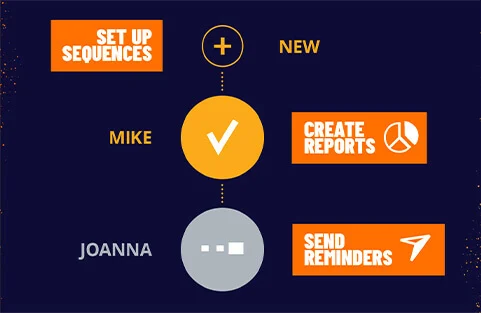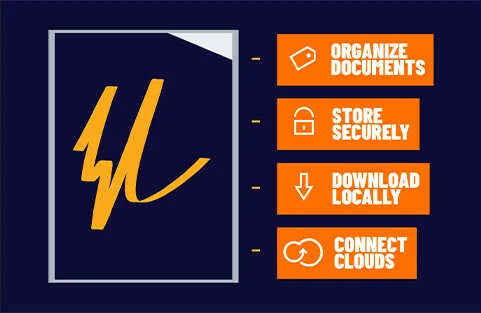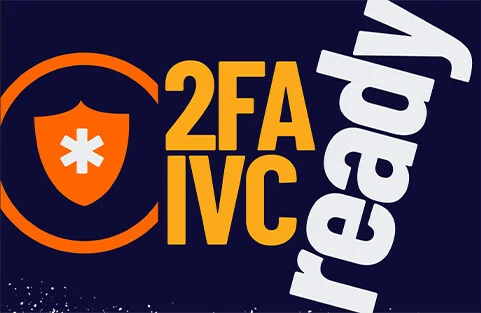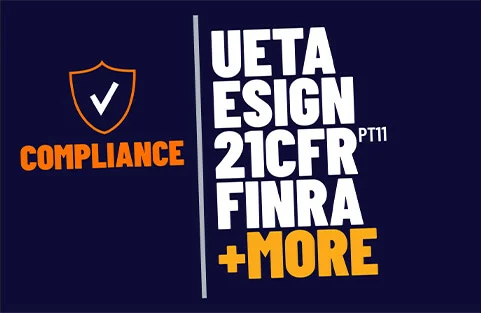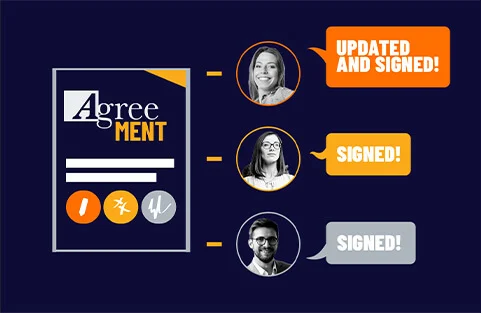The United States
Electronic Signature Law
The US has legally recognized the use of eSignatures with the Electronic Signatures in Global and National Commerce Act (ESIGN) passed in 2000. In addition, the Uniform Electronic Transaction Act (UETA) passed in 1999 has been adopted by 49 states, the District of Columbia, and the US Virgin Islands. Both laws have paved the way for the validity and broad use of electronic signatures for the purpose of facilitating business agreements in the United States.
Summary of the Law
Under the ESIGN Act, signatures may not be denied legal effect, validity, or enforceability solely because it is in electronic form. The Act defines an electronic signature as an “electronic sound, symbol, or process, attached to or logically associated with a contract or other record and executed or adopted by a person with the intent to sign the record”.
Under both laws, an eSignature is legally recognized as long as four criteria are met:
1Intent to sign – parties must clearly show intention to sign the document.
2Consent to do business electronically – parties must indicated consent to conduct business electronically.
3Association of signature with the record – when signed electronically, the system used to capture the transaction must keep an associated record that reflects the way the signature was produced, including time and date stamps.
4Record retention – a record of the signing must be kept and made reproducible to parties who signed the contract.
Exceptions
Electronic signatures are not recommended for documents such as:
- Wills, codicils and testamentary trusts
- Marriage and adoptions
- Divorce papers and court orders
- Power of attorney
- Mortgage agreements and certain real estate transactions
- Documents requiring notarization
Foxit eSign has been configured to comply with all local laws within this country relevant to electronic signatures.
Canada
Electronic Signature Law
Canada legally recognizes electronic signatures at the federal level under the Personal Information Protection and Electronic Documents Act (PIPEDA). Electronic signatures are also further supported at the provincial level through the Uniform Electronic Commerce Act of Canada (UECA), which serves as a model for eSignature legislation.
Summary of the Law
PIPEDA defines an electronic signature to mean “a signature that consists of one or more letters, characters, numbers or other symbols in digital form incorporated in, attached to or associated with an electronic document”.
In addition, Canada defines two types of electronic signatures, that is “electronic signatures” and “secure electronic signatures”. A secure electronic signature is a type of electronic signature that results from the application of a technology or process prescribed by a regulation. It is based on asymmetric cryptography. Secure electronic signatures are required to use under certain circumstances, such as documents used as evidence, seals, statements made under oath, and statements declaring the truth.
Regardless of the type of electronic signature, it must fulfil the primary function of a signature, that is:
- Ensuring the identity of the signer can be associated with the signature
- Clearly conveys the intent of the signer
- Demonstrates an agreement to be bound by the contents of the document
Exceptions
In multiple provinces, electronic signatures are excluded from usage for certain documents such as:
- Wills and codicils
- Trusts created by wills
- Power of Attorney
- Documents of title
- Negotiable instruments
Foxit eSign has been configured to comply with all local laws within this country relevant to electronic signatures.
Australia
Electronic Signature Law
Australia has legally recognized the use of eSignatures since 1999 through the Electronic Transactions Act (ETA). The act firmly acknowledges electronic signatures as instrumental to promoting and expediting business transactions in Australia.
Summary of the Law
Under the Electronic Transaction Act, a transaction is not invalid because it took place wholly or partly by means of one or more electronic communications. If the signature of a person is required, an electronic signature is legal and enforceable if it meets the following three requirements, which also apply under each Local ETA:
- A method is used to identify the signer and to indicate the signer’s intention to sign the document;
- The method used is as reliable as appropriate for the purposes of the communication or is proven to identify the person and indicate their intention;
- The signer consents to the method used, with such consent allowed to be express or inferred from the circumstances.
Exceptions
Electronic signatures are not recommended for documents such as:
- Wills
- Power of Attorney
- Real estate agreements
- Migration or citizenship documents
Foxit eSign has been configured to comply with all local laws within this country relevant to electronic signatures.
France
Electronic Signature Law
France, as a member state of the European Union (EU), follows eIDAS, the EU regulation on electronic identification and trust services for electronic transactions in the European market. Additionally, eIDAS is supplemented by French Civil Code, particularly article 1367, which establishes the validity of signatures in electronic form France.
Summary of the Law
Under Article 1367 of the French Civil Code, a signature which is required for a legal act identifies the author and demonstrates his or her consent to the obligations from that act. When the signature is in electronic form, it must use a reliable process of identification which guarantees its relationship with the act to which it is attached. When The reliability of the process is presumed until proven otherwise, the identity of the signatory is ensured, and the integrity of the act is guaranteed on the conditions fixed by Decree.
The EU passed regulations for electronic transactions called Electronic Identification, Authentication and Trust Services (eIDAS), which went into effect in 2014 and which France follows. The intent behind the regulation was to better facilitate digital growth among the EU’s 27 member states. eIDAS repealed the previous law, the eSign Directive, which did little to ensure that the recognition of an e-signature in one EU state also applied to another member state. In the most basic sense, eIDAS states that “an electronic signature shall not be denied legal effect and admissibility as evidence in legal proceedings solely on the grounds that it is in an electronic form or that it does not meet the requirements for qualified electronic signatures.”
Under eIDAS, member states need only follow one set of rules across the board. Three forms of e-signatures are officially recognized under eIDAS:
Electronic Signature
This is defined as “data in electronic form which is attached to or logically associated with other data in electronic form and which is used by the signatory to sign”. The regulation states that this type of electronic signature shall not be denied legal effect and admissibility as evidence in legal proceedings solely on the grounds that it is in an electronic form”.
Advanced Electronic Signature (AES)
This electronic signature type must be uniquely linked to and capable of identifying the signer. Signers also must be able to use signature creation data that is solely under their control and is capable of detecting tampering.
Qualified Electronic Signature (QES)*
This form or electronic signature uses certificate-based from an EU trusted service provider as well as qualified signature creation devices (QSCD). Under eIDAS, QES carries the same legal effect as handwritten signatures.
Exceptions
Although French law does not identify any agreements which electronic signatures are invalid, the following documents may require traditional signatures:
- Documents regarding the transfer of rights to property such as land titles
- Documents regarding family and inheritance law (e.g., wills, marriage, divorce, etc.)
- Documents requiring notarization
Foxit eSign has been configured to comply with all local laws within this country relevant to electronic signatures.
*Foxit eSign offers QES via ZealiD.
Germany
Electronic Signature Law
Germany, as a member state of the European Union (EU), follows eIDAS, the EU regulation on electronic identification and trust services for electronic transactions in the European market.
Two key laws that further govern the use of electronic signatures in Germany are:
1The Vertrauensdienstegesetz (VDG), or the German Trust Services Act which implements eIDAS and facilitates the use of electronic trust services in Germany.
2The Bürgerliches Gesetzbuch (BGB), or the German Civil Code which determines when written signatures can be replaced by the electronic form.
Summary of the Law
The EU passed regulations for electronic transactions called Electronic Identification, Authentication and Trust Services (eIDAS), which went into effect in 2014. The intent behind the regulation was to better facilitate digital growth among the EU’s 27 member states. eIDAS repealed the previous law, the eSign Directive, which did little to ensure that the recognition of an e-signature in one EU state also applied to another member state. In the most basic sense, eIDAS states that “an electronic signature shall not be denied legal effect and admissibility as evidence in legal proceedings solely on the grounds that it is in an electronic form or that it does not meet the requirements for qualified electronic signatures.”
Under eIDAS, member states need only follow one set of rules across the board. Three forms of e-signatures are officially recognized under eIDAS:
Electronic Signature
This is defined as “data in electronic form which is attached to or logically associated with other data in electronic form and which is used by the signatory to sign”. The regulation states that this type of electronic signature shall not be denied legal effect and admissibility as evidence in legal proceedings solely on the grounds that it is in an electronic form”.
Advanced Electronic Signature (AES)
This electronic signature type must be uniquely linked to and capable of identifying the signer. Signers also must be able to use signature creation data that is solely under their control and is capable of detecting tampering.
Qualified Electronic Signature (QES)*
This form or electronic signature uses certificate-based from an EU trusted service provider as well as qualified signature creation devices (QSCD). Under eIDAS, QES carries the same legal effect as handwritten signatures.
Exceptions
Electronic signatures are not recommended or allowed for documents such as:
- Deeds
- Documents requiring notarization
- Termination of employment relationships
Foxit eSign has been configured to comply with all local laws within this country relevant to electronic signatures.
*Foxit eSign offers QES via ZealiD.
United Kingdom (UK)
Electronic Signature Law
Following the UK’s withdrawal from the EU (Brexit), the eIDAS Regulation was adopted into UK law and amended by The Electronic Identification and Trust Services for Electronic Transactions to form the UK eIDAS Regulations. The UK eIDAS Regulations set out rules for UK trust services and establishes a legal framework for the provision and effect of electronic signatures. This Regulations are an amended form of the EU eIDAS Regulation and retain many aspects of the EU regulation but are tailored for use within the UK.
Summary of the Law
Similar to the EU-adopted eIDAS, The UK eIDAS Regulations provides three levels of electronic signatures:
Simple Electronic Signatures
This is defined as “data in electronic form which is attached to or logically associated with other data in electronic form and which is used by the signatory to sign”. The regulation states that this type of electronic signature shall not be denied legal effect and admissibility as evidence in legal proceedings solely on the grounds that it is in an electronic form”.
Advanced Electronic Signatures
This electronic signature type must be uniquely linked to and capable of identifying the signer. Signers also must be able to use signature creation data that is solely under their control and is capable of detecting tampering.
Qualified Electronic Signatures*
This form or electronic signature uses certificate-based from an EU trusted service provider as well as qualified signature creation devices (QSCD).
Exceptions
Electronic signatures are not recommended or allowed for documents such as:
- Wills
- Powers of attorney
- Documents that require notarization
Foxit eSign has been configured to comply with all local laws within this country relevant to electronic signatures.
*Foxit eSign offers QES via ZealiD.
